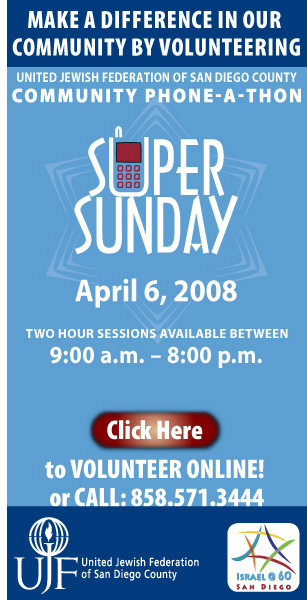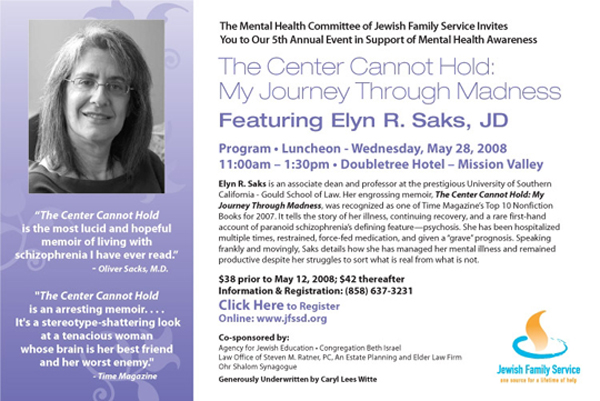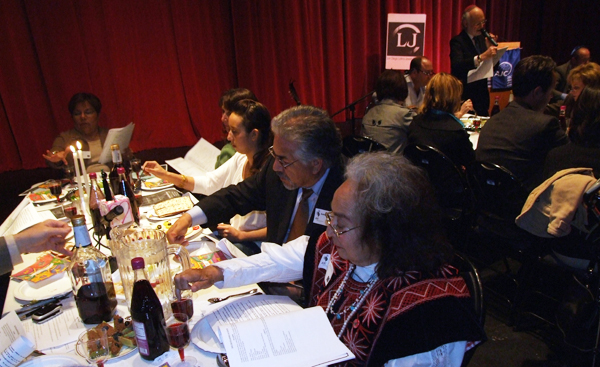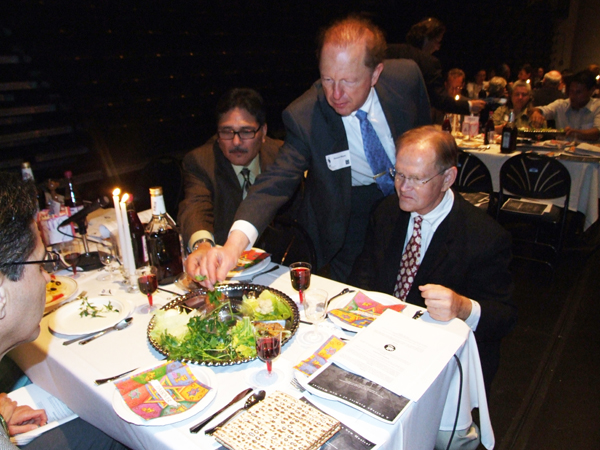| |
|
Friday, April 4: Family Shabbat services at Temple Solel
Sunday, April 6United Jewish Federation~Super Sunday

Monday, April 7 Jacob Goldberg Lecture: Iran versus Israel

Friday-Sunday, April 11-13 Mountain Chai~Big Boys Getaway

SUNDAY, APRIL 13 Beth Israel~Israel at 60 photo exhibit

Wednesday, May 28 JFS~Ellen Saks lecture on mental illness



.
THE JEWISH CITIZEN
The thought at the Red Sea: Si, se puede!
By Donald H. Harrison
 LA JOLLA, California—Tad Seth Parzen, president of the San Diego chapter of the American Jewish Committee, concluded a model seder for the Latino-Jewish Coalition on Tuesday evening, April 1, by recalling the story from Exodus about the time the Israelites were at the shore of the Red Sea with the thundering chariots of the Egyptians fast approaching them. According to a midrash, when Moses dipped his staff into the waters, they did not immediately part. Not until one of the Israelites waded into the sea, believing God surely would act, did the miracle of the parting of the waters occur. LA JOLLA, California—Tad Seth Parzen, president of the San Diego chapter of the American Jewish Committee, concluded a model seder for the Latino-Jewish Coalition on Tuesday evening, April 1, by recalling the story from Exodus about the time the Israelites were at the shore of the Red Sea with the thundering chariots of the Egyptians fast approaching them. According to a midrash, when Moses dipped his staff into the waters, they did not immediately part. Not until one of the Israelites waded into the sea, believing God surely would act, did the miracle of the parting of the waters occur.
Like Cesar Chavez, who organized California farmworkers and became a symbol of Latinos' quest for justice, that Israelite believed si, se puede (yes, it is possible), Parzen told coalition members and guests. The Latino Jewish Coalition, a group under AJC sponsorship, stresses links and common cause between the two peoples.
Indeed, during the abbreviated seder conducted by Rabbi Mel Libman of Congregation Shir Ami of Encinitas at the Lawrence Family JCC here, numerous analogies were made between Moses as a leader of the enslaved Hebrews and Chavez as the leader of exploited Mexican workers.
David Vallodolid, co-chair of the Latino-Jewish Coalition, noted that the preceding day was Cesar Chavez Day, which paid tribute "to the man who took us out of the slavery of the farms and the fields." He said that the annual Passover seder has meaning for all peoples because it teaches such values as respect and dignity.
Parzen said that the seder teaches Jews that they must show compassion for immigrants because "we were once strangers in a strange land." In a pluralistic society, he added, "it is important that we have compassion for each other."
Bernardo Ferdman, an Argentine Jew who serves as a coalition cochairman, suggested that there is "no more fitting match than between Cesar Chavez's struggle and the holiday of Passover... a holiday about freedom and justice." He added that "Passover happens every single year...we are still freeing ourselves."
While there were a sprinkling of other Jewish Latinos in the assemblage of approximately 70 people, most of the Latinos were Catholics. Rabbi Libman suggested that "both our religions are an envelope, but the contents are the same."
Libman said the eggs and the greens on the table both symbolized spring and the renewal of life Prior to the karpas ceremony, in which the greens are dipped in salt water to recall the tears of slavery, the Conservative rabbi asked participants if they could think of any place where people are enslaved today. "Darfur!" called out one. "Tibet!" said another. "Guantanamo Bay," said yet another. Others called out such victims "substance abusers," and "women in many societies."

The seder service was constructed to include readings in five languages: Hebrew, Aramaic, English, Spanish and Ladino. There were also amendations to various service parts—for example, the Haggadah created for the occasion included Four New Questions for participants to ponder.
Written by Rabbi Glenn Ettman, assistant rabbi at Congregation Beth Israel, these were:
1) "What if Moses were alive today? To where would Moses lead the Jewish people? Why would the Jewish people follow him? Why would Moses do it? Why did he lead the people in the first place?"
2) ".. (A)fter attaining fredom thing were not always perfect. What are some of the dangers of freedom? In what ways can "being free" go too far? Is there ever any time when people are truly and completely free?"
3. "...What are some things that this year we are being liberated from or wish to be liberated from? How would you finish (the) sentence 'Tonight, I celebrate my freedom from...' What better times do you hope to attain this year?"
4. "...Why is remembering Jewish history important? Why is passing holiday family tradition so important? What is the significance to thinking about the uture and what the next journey will bring? In what ways are all three connected to the whole theme of the holiday?"
Click here for easy-to-clip coupon. Product available at Ralphs in La Jolla; The Place in College area
 | |
LETTER FROM JERUSALEM
Violence, not settlements, blocks peace
By Ira Sharkansky
 JERUSALEM—It is not the settlements, stupid. JERUSALEM—It is not the settlements, stupid.
Remember "It's the economy, stupid," which helped Bill Clinton send George H. W. Bush to the coast of Maine and the environs of Houston.
Can this twist change the priorities in Washington, other capitals, and lots of universities? The feeling is widespread, but wrong, that Jewish settlements in the West Bank are the crucial hindrance to any agreement between Israelis and Palestinians. Land is one of the Palestinians' slogans, and they do not miss an opportunity to accuse Israelis of stealing theirs.
Israel made a difficult and testing gesture toward the Palestinians in 2005 by withdrawing all of the Jewish settlements in Gaza.
The result? More than 2,400 rockets, mortars, and assorted other attacks from Gaza directed at civilian settlements in Israel.
In various agreements Israeli governments have committed themselves to stop the expansion of settlements in the West Bank, to remove what are called "illegal settlements," i.e., those not established under the aegis of an Israeli authorization, and to lessen the pressure against Palestinian movement that comes from the roadblocks meant to frustrate terrorists.
In parallel, Palestinian authorities committed themselves to work toward an end of violence and the incitement toward violence, and to reform their government in the direction of greater transparency, efforts against corruption, and judicial proceedings that truly are law abiding.
One can argue as to which side has accomplished the least of its commitments.
Incitement and preparation of violence continues in the West Bank, despite substantial numbers of security personnel employed by the Palestinians. Often it is members of those Palestinian security services who are seized in the IDF sweeps against perpetrators, or killed at the site of their efforts by the IDF.
Palestinians demand an absolute halt to building over the line that separated Israel from the West Bank prior to the 1967 war. Israel responds that it did not commit itself to stop further building in neighborhoods annexed to Jerusalem, or to stop all construction within the borders of other settlements.
The settlers who are most vocal are religious nationalists fanatic about Jewish occupation of the Land of Israel. Secular Israelis and numerous religious Israelis have limited tolerance for their intense and selective quotations from Torah, their implacable hatred of Arabs, and their occasional actions against individual Arabs and olive trees. Yet when the fanatics and moderate settlers remind us what happened when Israel removed settlements from Gaza, the tendency is to listen. When they carry the argument against withdrawing further settlements, it is by persuading centrists and not because of their raw political power. The principal political party that represents them (National Unity-National Religious Party) has only 9 members in the Knesset; and neither it, nor its right wing allies (Likud and Israel our Home) are in the government.
Religious nationalists have tried for 40 years to populate the Land of Israel with their kind of people. They have a larger than average rate of reproduction, but neither that, nor recruitment efforts among religious and secular Israelis has met their aspirations.
There is a new player in the settlement game. Two sizable and growing communities of the ultra-Orthodox are over the pre-1967 border south of Jerusalem and across the road from Modiin. The ultra-Orthodox are not intense about settling the Land of Israel. They want low-cost homes. Their needs reflect large families, early marriage, further generations of large families, the shortage of apartments and increasing prices in their established neighborhoods of Jerusalem and Bnei Brak. There is also the desire of ultra-Orthodox and secular Israelis that the ultra-Orthodox live in their own neighborhoods. There they can close the roads on the Sabbath, ban television, the internet, secular newspapers, non-kosher food, and abominable music, make sure that women dress modestly, and send their young toughs against those who violate the rules.
Until now, Palestinians have campaigned against the settlements on what they call their land, and demanded help in their efforts from the United States and other foreign governments.
In the absence of any serious and prolonged efforts to convince Israelis that they can end violence and incitement in order to live at peace alongside us, their campaign against settlements has limited success. Construction gangs employing Palestinians along with Chinese, Romanians, Turks, and Israelis continue to build within the neighborhoods of Jerusalem and established settlements outside of Jerusalem. Left-wing Israelis and occasionally government ministers speak about withdrawing illegal settlements, but responsible officials show limited enthusiasm for the task.
Most Israelis want to make concessions. But the intensity of those who respond positively to survey questions is not great enough to carry the issue. For people here and abroad who think that Israeli action on settlements would solve the problems of the Middle East, the missing ingredient is Palestinian violence. Gaza remains as the best argument that settlements are not the issue, and the complacency of West Bank Palestinians toward violence reinforces that conclusion.
Palestinians can achieve a state of their own on the West Bank. It will not be a large place. If current realities continue, it will not include Gaza. The road to statehood is not to emphasize Jewish settlements, but to emphasize Palestinian efforts to end the violence. Only that can stop the growth of settlements, and preserve something for a Palestinian state. Without that, the road to Palestinian statehood will end about where it is now.
A free copy of San Diego Builders of Israel
 SAN DIEGO—Many of the writers for San Diego Jewish World participated in the creation of San Diego Builders of Israel, a booklet tracing the interactions between San Diego and Israel since before the creation of the State of Israel in 1948. Published by the United Jewish Federation of San Diego, the book was first distributed Sunday, March 30, at the San Diego Jewish Music Festival. Now, the booklet may be accessed in PDF format here. SAN DIEGO—Many of the writers for San Diego Jewish World participated in the creation of San Diego Builders of Israel, a booklet tracing the interactions between San Diego and Israel since before the creation of the State of Israel in 1948. Published by the United Jewish Federation of San Diego, the book was first distributed Sunday, March 30, at the San Diego Jewish Music Festival. Now, the booklet may be accessed in PDF format here.
The indexed book contains two chapters written by Donald H. Harrison, tracing the development of community organizations raising money and spurring investment in the State of Israel.
Next follows a chapter by Gerry Greber on participants in the Israeli military who live in San Diego.
Yiftach Levy tells of diplomatic connections between San Diego and Israel.
Rachel Yourtz explores the connections between our areas in the fields of medicine, science and technology.
Norman Greene writes about travel and tourism from San Diego to Israel.
Charly Jaffe and Gabrielle Maio tell about the special relationship between San Diego and Sha'ar Hanegev.
Sheila Orysiek and Harrison team up to describe arts and cultural connections that have occurred over six decades.
Irvin Jacobs describes the connnections San Diego synagogues make to the Holy Land.
David Strom tells of educational exchanges between the two areas.
And, Norman Manson shares sports developments that unite the two areas.
Harrison served as overall coordinator of the project.

 THE VIEW FROM JINSA THE VIEW FROM JINSA
Maliki's victory: Iran's big setback in Iraq
By Shoshana Bryen WASHINGTON, D.C.—Basra. Where the British were and where the surge wasn't. Where Moqtada Sadr took support and arms (and military advisors?) from Iran and where the Baghdad government wasn't. Until now. WASHINGTON, D.C.—Basra. Where the British were and where the surge wasn't. Where Moqtada Sadr took support and arms (and military advisors?) from Iran and where the Baghdad government wasn't. Until now.
It was one more thing the critics said would never happen, and that's why they demanded it - to have the Iraqi army fight the Shiite militias in the name of the central government. But even critics of the war and the Iraqi government didn't think to suggest that the Shiite Prime Minister go to the battlefield and encourage the national army to control the southern part of the country. But he did.
Basra. Where the Iraqi Army fought for the oil terminals, the primary revenue sources, in the name of the country.
Basra. Iraq's Altalena? "The arms belong to the government," Ben Gurion said as he ordered the sinking of Menachem Begin's ship bringing much-needed weapons to newly independent Israel, but in the name of the Irgun, not the government. Only one army can live in a country at any one time, and that army has to belong to the government. The other model is Lebanon. [The American army, like the British, is a holding operation to support the government, and it will leave. The Iranians are seeking permanent control of southern Iraq through the militias.]
The game isn't over yet. The Iraqi army didn't win an outright victory and the militias are being given time to stand down. Various Shiite groups, including some in the government, are still jockeying for power. The Iranian presence among the fighters is the most important reason to insist that the Baghdad government be the only one with an army in Iraq, and it is the reason we will likely see more bloodshed rather than less. But the al-Maliki government clearly understands it must govern everywhere. The indispensable MEMRI brings us an interesting comment from Moqtada Sadr in Tehran:
Sadr: It's a little difficult to combine studying with the direct leadership of society. I can only move forward in one of these two directions. I have dedicated five years to society, and now I want to dedicate a few years to my studies, so I can be of more benefit to society... at this point in time, I want to progress in my knowledge and faith.
Interviewer: Since you claim that Iraq is now occupied... do you support conducting acts of armed resistance, in order to liberate Iraq from the occupying American forces, as you call them?
Sadr: On condition that these acts do not harm the Iraqi people.
Asked if the Mahdi Army would be disbanded, Sadr replied: This will be the army of the Reformer [the Mahdi], Allah willing. At the end of time, the Mahdi will appear, and if by that time, we are still around, and if we are capable mentally, physically, militarily, and in terms of faith, we will all be his soldiers, Allah willing. Hence, the Al-Mahdi Army is a matter of faith, and it cannot be disbanded.
So, Sadr is going to devote himself to study in Tehran and the Mahdi Army will be ready when the Mahdi comes. Whenever.
Sounds like a victory for the good guys and one more step in the creation of an Iraq that can determine its priorities and fight for them.

Please click on the schools' ads to visit their respective websites


SDJA Student Quarterly
Like or hate it, Atonement garners 'Whys?'
By Michelle Rizzi
 SAN DIEGO—Atonement, based on the novel by Ian McEwan, stars Keira Knightly and James McAvoy. The Joe Wright film has won at the British Academy Film Awards, the Golden Globes (Best Picture Drama), Houston Film Critics Society Awards, San Diego Film Critics Society Awards, the satellite Awards and an Academy Award for music score. SAN DIEGO—Atonement, based on the novel by Ian McEwan, stars Keira Knightly and James McAvoy. The Joe Wright film has won at the British Academy Film Awards, the Golden Globes (Best Picture Drama), Houston Film Critics Society Awards, San Diego Film Critics Society Awards, the satellite Awards and an Academy Award for music score.
In England 1935, young Briony Tallis (Saoirse Ronan) mistakenly and permanently changes the life of her sister Cecilia Tallis (Knightly) and that of her lover, Robbie Turner (McAvoy). She accuses Robbie of a crime he did not commit, and the rest of the film is that of Briony's search for atonement, redemption and understanding of the power of love.
The events which serve as her atonement are those of pure imagination, which ultimately puts a nice twist in the film. Confusion that the audience may have had throughout is cleared up via narrative at the end.
Tears may be shed, your heart may be broken, you may ask "Why?" Or, if you're a guy, you may be falling asleep, counting down the minutes and asking "Why?!" but in a different context. In other words, Atonement is the ultimate tragic love story. Those who enjoyed The Notebook are bound to enjoy Atonement.

SAN DIEGO JEWISH WORLD THE WEEK IN REVIEW
Wyman Brent in Vilnius, Lithuania: So, how will a nice Gentile boy help to restore Jewish learning in Lithuania?
Carol Davis in San Diego: Racism, anti-Semitism, sexism combine in lesbian love story at the Diversionary
Alex Grobman in Englewood, New Jersey: Rabbi Herbert Friedman, founder of Wexner Heritage Foundation, dies at 89
Donald H. Harrison in La Jolla, California: Sha'ar Hanegev citizens familiarize themselves with Reform Judaism
Eileen Wingard in San Diego: A Jew and Muslim to make music together
Donald H. Harrison in San Diego: Fictional Israeli P.I. fails 'memorable' test
Sheila Orysiek in San Diego: What music performance means
Gary Rotto in San Diego: My, how San Diego AIPAC has grown
Dorothea Shefer-Vanson in Mevasseret Zion, Israel: Britain's descent into anti-Semitism
From SDJA Student Quarterly, reviews by students:
Harry Doshay in San Diego: Anthology's linup thrills jazz fans
Alexa Katz in San Diego: Mesquite Restaurant: A gem in Scripps Ranch
Michelle Rizzi in Del Mar: Pannikin: The Anti-Starbucks
Shoshana Bryen in Washington, D.C. South America's growing terrorist threat
Cynthia Citron in Los Angeles: Production celebrates Albert E, musically
Kathi Diamant in San Diego: My quest to solve a literary mystery
Donald H. Harrison in San Diego: Sha'ar Hanegev seeks rocket-proof school
Rabbi Dow Marmur in Jerusalem: Some advantages to a peace with Syria
Sheila Orysiek in San Diego: Miller's needle: Revenge in a tailor shop
Shoshana Bryen in Washington, D.C.: U.S. must lend support to Colombia as it fights narco-terrorists tied to Hezbollah
Charly Jaffe in San Diego: A teen's guide to Old Ladies
Rabbi Baruch Lederman in San Diego: The honor of service to veterans
Rabbi Dow Marmur in Jerusalem: Anti-Israelism: The new anti-Semitism
Rabbi Leonard Rosenthal in San Diego: On Post Bar/ Bat Mitzvah Letdown
Ira Sharkansky in Jerusalem: Why cynicism abounds in Middle East
And:
From the archives: We reprint from the 1953 Southwestern Jewish Press a trailblazing two-part series by Alice Craig Greene that exposed La Jolla's discriminatory housing policies against Jews
Carol Davis in San Diego: Sondheim's 'Night Music' a Cygnet success
Peter Garas in Canberra, Australia: So maybe Eden wasn't where we thought
Donald H. Harrison in San Diego: Lessons from historical preservationists
Rabbi Dow Marmur in Jerusalem: Israel's confounding aliyah problem
Gary Rotto in San Diego: Puzzling through the divestiture debate
From SDJA Student Quarterly, a publication of San Diego Jewish Academy: Will Bohannon, Jordan Dubin and Charly Jaffe, all in San Diego: SDJA seniors tell presidential choices
And:
Sheila Orysiek: Reluctant Martyr, Chapter One (novel serialization)
Link to previous editions
< BACK TO TOP
|
|

 —
—